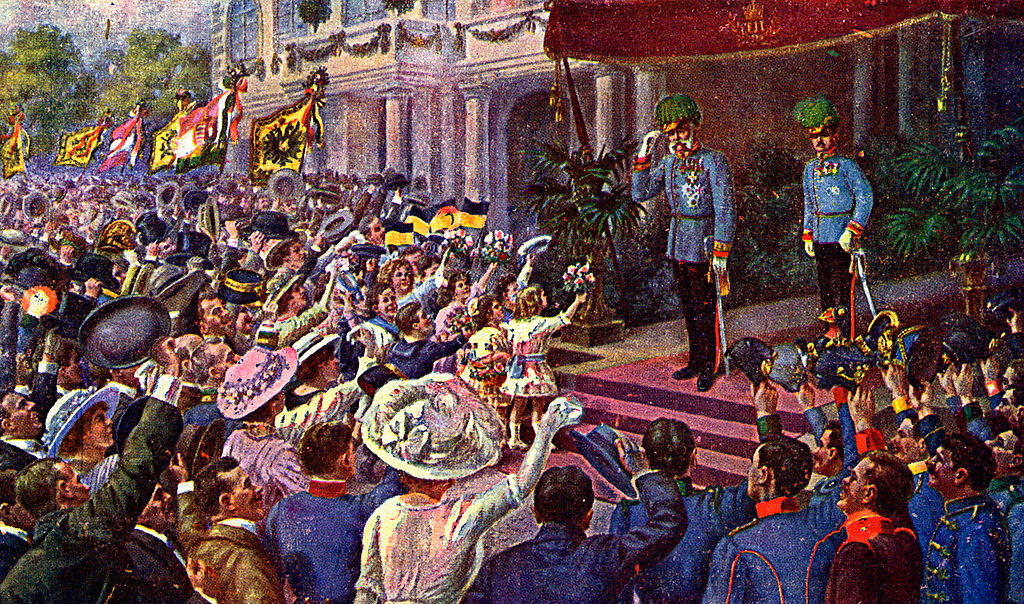With the 2024 EU elections now concluded, it is time to start planning for Europe’s true turning point: the next electoral round, in 2029. There is not a moment to lose.
Five vital years
This year’s ballot was never going to be decisive. As argued in these pages before, European politics has entered a “revolutionary” period from around 2015/16. By historical standards this cycle will last between 15-20 years. We are now halfway or maybe even two thirds into it. In other words, this is a transitional period, where the main trends (in our case, towards right-wing populism or “hard Right” ascendancy) accelerate but do not quite make it.
The mixed results of the June election fully bear this out. The centre has indeed held — but only on paper, and in a very qualified sense. The real takeaway is that Europe’s populist revolt has consolidated and gained momentum. The ECR and ID-aligned parties have five years to prepare for the final assault on the Brussels power structure, in 2029. The euro-Establishment will likewise use this interval to try and suppress the right-wing “insurrection” by every available means. So the grand battle is yet to come. Or is it?
US-style polarisation
The aftermath of the elections has confirmed what was widely expected: that when wounded but not politically-killed, the Establishment will only double down rather than compromise. We are now treated to the spectacle of the EU elites divvying up the top jobs amongst the same Eurocrats whose policies are the very driver of the current upheaval and Europe’s decline.
Burying their heads in the sand when the walls are closing in, and clinging to a “nothing to see here” narrative, is the classic response of ancien regimes. And, in the end, it doesn’t work.
The trouble is that the other side — Europe’s sovereignist hard Right — is not exactly overflowing with clever strategic thinking and true political acumen either. By and large, it really is a populist movement that feeds on popular discontent rather than a pragmatic enterprise with credible, detailed solutions and the leadership to implement them.
Most (not all) of its leaders are narcissistic demagogues who often seem to enjoy playing the low-risk, high-reward “tribune of the plebs” role in opposition, rather than working pragmatically and seriously for winning power.
Their broad-brush rhetorical arguments against the failed liberal elite consensus happen to be correct on a whole range of vital issues, from regulation to immigration or the Green Agenda. But their (often superficially framed) prescriptions tend to be so radical as to scare their political foes into equally uncompromising attitudes and responses.
So, as things stand, European politics is on a path to nowhere — certainly, nowhere good. It is looking increasingly similar to what is happening across the Atlantic, but without America’s extraordinary wealth and to absorb the macro consequences of the political mayhem.
Europeans must learn the lessons from America’s political meltdown and ultra-polarisation: we don’t want to continue to import or mimic that kind of increasingly radical political division.
Avoiding this future will take some conscious political decisions and a revision of the current thinking among the European hard Right.
This is difficult, not least because the intellectual debate on this side of the spectrum is increasingly driven by American ideas and rhetoric of the MAGA variety — but also by Americans now operating in Europe, like Gladden Pappin who heads the Hungarian Institute for Foreign Affairs or Yoram Hazony with his National Conservative movement. Many will also remember Steve Bannon’s explicit efforts to set up a kind of “MAGA academy” in Italy, post-2016.
There is of course nothing intrinsically wrong with the circulation of American conservative ideas on the European Right. A richer debate is always to be welcomed. The problem is with the increasing adoption of American political framings into the European debate, to the point where the European Right appears to be turning into an intellectual branch of Trumpist conservatism.
Why is it a problem? Because the US nationalist populist (Trumpist, in short) critique of “liberalism” has developed in response to political pathologies and cultural factors specific to America — whether its history of slavery or its religious conservatism, not to mention the radically different geopolitical and constitutional outlooks of the American Republic.
Europe’s problems (again, from immigration to social policy or free speech, but also things like economic policy) may be similar, but the context is different — requiring different political messaging and strategies.
One prominent example is the Ukraine question. MAGA conservatives in the US see it as a waste of money on what they consider to be a European problem, and want to push Ukraine into a “peace deal.”
Some of their European counterparts copy their rhetoric to stay in tune and on message with the Trump movement, whether instinctively or deliberately, and arrive at the same conclusions. The fact that the Ukraine war carries much higher stakes for Europe than for the US thus becomes obscured in an ideological debate conducted in American terms.
No one wins
European politicians on all sides need to take a step back and consider the realities of the continent’s situation, because on current trends everything is only getting worse. Polarisation is increasing as the Establishment tries to suppress the political revolt, while the populists try to bring down the Establishment. The result is certainly more dysfunction (starting with the EU itself), which means a weaker Europe, but likely also less democracy, in time, as both sides must fight with ever more extreme means.
The hard Right may well triumph in the end, and perhaps gain true power within the EU institutions in 2029 – and in various countries in the meantime – but it cannot do so without major disruptions which will come with economic and security costs.
Equally, the “System” may well hold the populist wave at bay, but in doing so it will only “win” the chance to continue with the disastrous policies of recent times and bury Europe for good.
Over the next five years all this European drama will play against an ever more unforgiving global context — a world increasingly shaped by China and the US (which the “conservative” detractors of Atlanticism like would like to see less closely tied to Europe), in which Europe becomes truly subordinate to others’ interests.
This future will not help anyone in Europe. Even if the populists do somehow take control of the EU (a big “if”), they will inherit a geopolitical and economic ruin and deeply divided societies. And if the Brussels “regime” sees off the hard Right threat, it will be a hollow victory: they will only get to enjoy their power over European affairs for a moment longer, before seeing their future rapidly sink along with everyone else’s in Europe, in the next few years.
There is no scenario in which any side in Europe’s current political stand-off truly wins anything from what is coming. So clearly something’s got to give. A grand reset of European politics is in order.
A third way
The project for 2029 should be to define and build a pragmatic “third way” in European politics, by re-combining elements from both the reigning Establishment centrist coalition and from the hard Right populist insurgency. Its premise would be the harsh reality outlined above: that there is only ruin for all, ahead, if we continue as we are.
Its mission: to create a new political consensus — weighted towards the Right in policy terms — within the EU for “fixing” policy mistakes and restoring European power on the world stage. Call it a new “hard centrism.”
Sceptics will counter that no such compromise is possible, and that the eurofederalist-eurosceptic “war” (or liberal centrist v conservative hard Right, or elite v populist — pick your favourite description) is too far advanced.
But two facts stand against that argument.
First, the time is ripe: both sides are increasingly fragmented and split on key policy questions. The liberal centrist establishment, whether at EU or national level, is now seeing an increasing radicalisation from the Left on issues like climate change, Palestine and (as France shows) even economic issues. Meanwhile, the hard Right is all over the place on economics (statists v small-state classic liberals), Ukraine or relations with China.
The second fact is that Europe’s dire situation — including things like the increasingly visible urban effects of immigration, but also the broader geopolitical outlook — is now of real concern to large swathes of the Establishment itself.
Leaving aside hopeless cases like the Verhofstadts of this world, the idea that the European Establishment is highly ideological, en bloc, and dedicated to the postmodern liberal excesses of the woke era, is only a superficial reading. Only parts of the upper echelons of elite eurocrats are; everyone else, the rank and file of the bureaucracy, take their cue from the top and fall into line.
In most cases what is really motivating these people is an ultimately utilitarian sense that their personal success is bound up with perpetuating the existing “system,” with all its “values” and principles. This is primarily why these “elites” react so viciously against “populism”: because they see this as a threat to their material privileges and interests.
The main principle in forging a new consensus for European power, therefore, is to co-interest the elites in this project, not work against them. The fact that they are already concerned at Europe’s prospects is an open door.
On the populist right side of the equation, the case for accepting a move towards a new Hard Centrist consensus would be grounded in the increasing realisation that the concentration of power at the heart of the EU is, for all intents and purposes, irreversible. This is partly why even inveterate Eurosceptic parties like Le Pen’s or Orban’s have moderated their end-goals in relation to the EU, preferring to now talk about “taking it over” rather than actually rolling it back.
So if the EU cannot be “taken over” (except in a Pyrrhic fashion, in an ultimately self-defeating manner), and if it will not be meaningfully rolled back, the only real option left may be to accept the principle of euro-centralisation of power, but in the guise of a more conservative project. This conservative redesign would be done under a new partnership with pragmatic Eurocrats interested first and foremost in power — theirs, and Europe’s.
Quite clearly, this sort of grand realignment in European politics would put the EU on a path to a conservative form of eurofederalism — as opposed to both the “Europe of Nations” imagined by many sovereignist eurosceptics, and to the supranational United States of Europe of classic eurocrat dreams.
The key elements of the centrist euro-establishment of today would compromise on its liberal policies, accepting the hard Right reforms to immigration and so on. In its turn, the key elements of the “populist revolt” would compromise on “sovereignty” and nationalism, accepting that in the global context of the 21st century Europe either acts as a coherent unit in world politics or becomes an appendage of the US or Chinese spheres of influence.
A “hard centrist” European conservative “imperial” project might sound counter-intuitive given the current makeup of EU politics, and the framings we are used to. But it may be the only viable option for Europe’s future as a community of free peoples and the only worthwhile political project for 2029. What we know for sure, though, is that things cannot continue as they are.
Gabriel Elefteriu is deputy director at the Council on Geostrategy in London and a fellow at Yorktown Institute in Washington, D.C.






Why private equity danger is strangely reminiscent of 2008